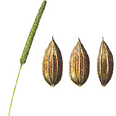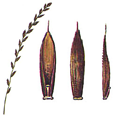Home » Gramineae

FODDER PLANTS - GRAMINEAE
All the seeds listed below are available also with biological agriculture.
Tall fescue (Festuca arundinacea Schreb.)

This is one of the most longeval among Gramineae (6-10 years). Festuca arundinacea adapts itself to various kind of surroundings and to a large range of temperatures. Under the same conditions it is the most productive.
Doses and ways of sowing:
Sowing on bare ground is done mechanically in rows using 50-60 kg/ha of seeds. We advise to roll the ground to improve contact between seeds and ground after sowing.
Different available varieties.
Orchad grass (Dactylis glomerata L.)

One of the characteristic of the Dactylis is its elasticity of use, so it is excellent for mowing and pasture. Growing usually has a duration of 3-5 years. It's a resistant plant even to long dry or cold weather conditions. It has a good productivity if grown in fertile and deep soil.
Doses and ways of sowing:
On bare ground it offers the best possibilities of success. Mechanical sowing in rows takes 30-40 kg/ha of seeds. It's advisable to roll the ground after sowing.
Different available varieties.
Timothy (Phleum pratense L.)

This plant is good overall in humid surroundings with very cold temperatures, but it can withstand long hot summer periods. Growing has a duration of 4-6 years. It adapts itself to soil with acid reactions.
Doses and ways of sowing:
Growing with soil in purity, mechanical sowing is used in rows 5.13-7.11 inches; apart followed by a light rolling.
Different available varieties.
Italian ryegrass (Lolium Multiflorum Lam.)

This is an annual or biennial plant. It comes from the Mediterranean Basin. Excellent for herbarium. Vegetative capacity is prolonged until late Autumn and has a precocious vegetative resumption. Because of its high aggressiveness it is not used for mixtures.
Doses and ways of sowing:
Sowing is done by machine in rows spaced out 3.95-4.74 inches apart, followed by a light rolling. Advised doses of seed are: diploidi varieties 35-40 kg/ha; tetraploidi varieties 40-45 kg/ha.
Different available varieties.
Perennial ryegrass (Lolium perenne L.)

Lolium perenne is a typical plant for mild humid areas.It supplies a good and appetizing quality of fodder. This growing is simple and fast and has a duration of 3 to 6 years. Essentially very good for pasture, with good capacity of regrowth.
Doses and ways of sowing:
Sowing has to be done mechanically in rows spaced out 3.95-4.74 inches, followed by a light rolling. Sowing depth 0.39-0.79 inches, for single growings 35-40 kg/ha, for cv. diploidi.
Different available varieties.




